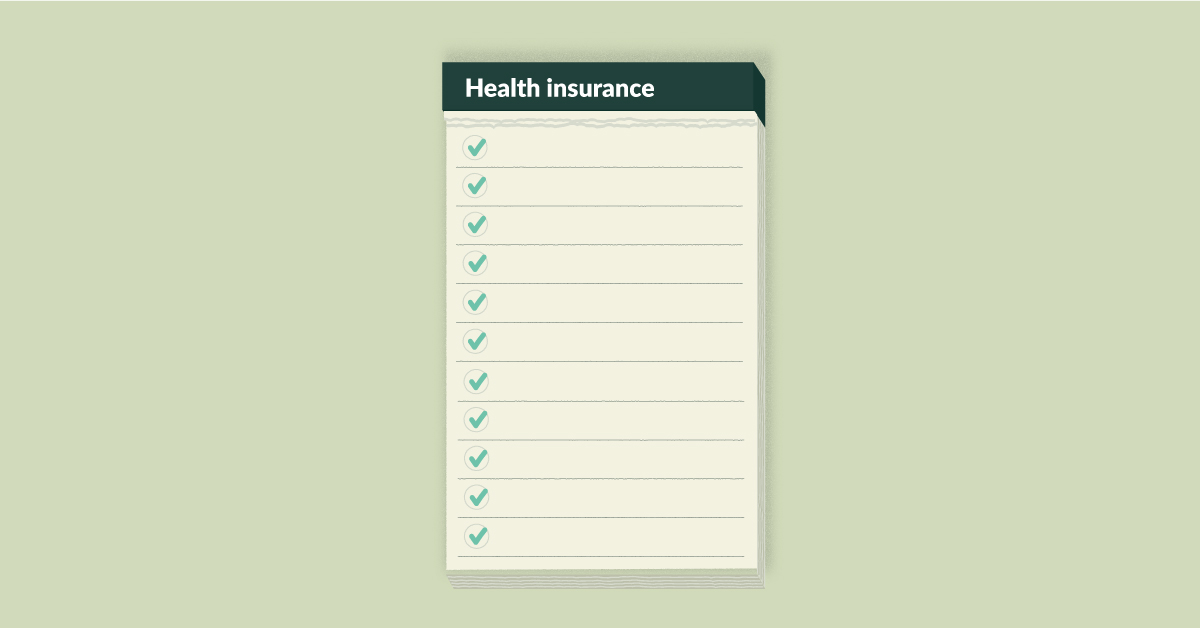When it comes to securing your health and financial future, choosing the right health insurance policy is crucial. With numerous options available, making an informed decision can be challenging.

To simplify this process, we have compiled a comprehensive health insurance checklist that highlights the essential factors to consider before you buy a health insurance policy. This guide will help you to identify the best health insurance plan tailored to your needs.
1. No Room Rent Limit
One of the most critical aspects to check in a health insurance policy is the room rent limit. Policies with no room rent limit offer you the flexibility to choose any hospital room without worrying about additional charges. It can significantly reduce your out-of-pocket expenses during hospitalisation.
2. No Co-Payment
Look for policies that do not require co-payment, which is the percentage of the claim amount that you need to pay out of your pocket. A no co-payment policy ensures that the insurer covers the entire cost of treatment, providing you with financial relief during medical emergencies.
3. Unlimited Restoration Benefit
Opt for a health insurance plan that offers unlimited restoration of the sum insured for the same person and same illness. This feature ensures that your coverage is reinstated even if you exhaust the sum insured during a policy year, safeguarding you against multiple hospitalizations.
4. Comprehensive Pre-Post Hospitalisation Cover
Ensure that the policy provides extensive coverage for medical expenses incurred before and after hospitalisation. This includes diagnostic tests, doctor consultations, medications, and follow-up treatments, giving you comprehensive protection.
5. No Sub-Limits on Disease Treatment
Choose a policy with no sub-limits on the treatment of specific diseases or illness. Sub-limits can restrict the amount reimbursed for particular treatments, leading to higher out-of-pocket expenses. A policy without sub-limits provides broader coverage and financial security.
6. Lifelong Renewability
Verify that the health insurance plan offers lifelong renewability. This feature ensures that you can renew your policy without any age restrictions, providing continuous coverage throughout your life.
7. Extensive Hospital Network
A policy with a vast network of empaneled hospitals ensures that you have access to quality healthcare facilities across the country. It also facilitates cashless hospitalization, simplifying the claims process and reducing financial stress during medical emergencies.
8. Reliable Insurance Agent
Having a knowledgeable and reliable insurance agent can make a significant difference. They can guide you through the process, help you understand the fine print, and assist in claim settlements. Ensure that you choose an agent with a good reputation and customer reviews.
Additional Considerations
Disclosure of Pre-Existing Diseases: Always disclose all pre-existing diseases at the time of buying the policy. Non-disclosure can lead to claim rejections, leaving you financially vulnerable during critical times.
Buy Individual Policy Even if You Have Corporate Coverage: Even if you have a corporate health insurance policy, it is advisable to purchase an individual health insurance plan. Corporate policies may not be sufficient and might not cover you after retirement or job change.
Affordable Premiums for Young Buyers: For a 30-year-old, a health insurance policy can be quite affordable. For instance:
- A base policy with a sum insured of INR 10 lakh can cost around INR 12,000 annually.
- A super top-up policy with an additional cover of INR 90 lakh can cost approximately INR 2,000 annually.
- Thus, a total cover of INR 1 crore can be secured for just INR 14,000 annually on individual plans.
Purchase When Healthy
It is crucial to buy health insurance when you are healthy. Once you develop a critical illness, getting a policy can become difficult or even impossible. Early purchase ensures coverage when you need it most.Conclusion
Choosing the right health insurance policy requires careful consideration of various factors. By following this health insurance checklist, you can ensure that you select a policy that offers comprehensive coverage, financial protection, and peace of mind. Remember, health insurance is not just an investment in your health but also in your financial stability.
Explore the best health insurance plans tailored to your needs and secure your future today.
Visit Coverfox Health Insurance Plans to find the perfect policy for you and your loved ones. Protect yourself and your loved ones by making an informed decision today.





